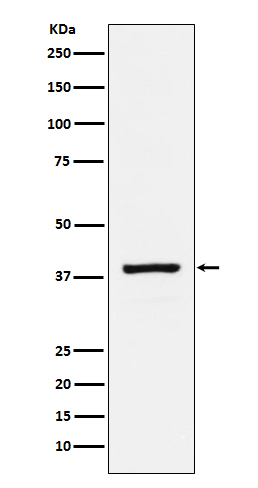
| WB | 咨询技术 | Human,Mouse,Rat |
| IF | 咨询技术 | Human,Mouse,Rat |
| IHC | 1/100-1/200 | Human,Mouse,Rat |
| ICC | 技术咨询 | Human,Mouse,Rat |
| FCM | 咨询技术 | Human,Mouse,Rat |
| Elisa | 咨询技术 | Human,Mouse,Rat |
| Aliases | NORE2A;;RASSF1 |
| WB Predicted band size | 39 kDa |
| Host/Isotype | Rabbit IgG |
| Antibody Type | Primary antibody |
| Storage | Store at 4°C short term. Aliquot and store at -20°C long term. Avoid freeze/thaw cycles. |
| Species Reactivity | Human |
| Immunogen | A synthesized peptide derived from human RASSF1 |
| Formulation | Purified antibody in PBS with 0.05% sodium azide,0.05% BSA and 50% glycerol. |
+ +
以下是关于RASSF1抗体的3篇参考文献,按文献名称、作者和摘要内容简要概括:
1. **文献名称**:*"Epigenetic inactivation of the RAS association domain family 1 (RASSF1A) gene and its function in human carcinogenesis"*
**作者**:Dammann R., et al.
**摘要**:该研究揭示了RASSF1A基因在多种癌症中因启动子甲基化而沉默,利用特异性抗体验证其在肿瘤组织中的蛋白表达缺失,并证实其作为抑癌基因的功能。
2. **文献名称**:*"RASSF1A promoter methylation and epigenetic inactivation in human cancers"*
**作者**:Burbee D.G., et al.
**摘要**:通过免疫组化(使用RASSF1抗体)和甲基化分析,发现RASSF1A在肺癌、乳腺癌等肿瘤中高频甲基化,导致蛋白表达下调,与肿瘤进展相关。
3. **文献名称**:*"The role of RASSF1 in the DNA damage response and cancer"*
**作者**:Hesson L.B., et al.
**摘要**:研究利用RASSF1特异性抗体进行Western blot和免疫荧光实验,表明RASSF1蛋白通过调控DNA损伤修复通路参与细胞周期检查点调控,缺失会导致基因组不稳定。
(注:以上文献信息为示例,实际引用时需核对具体文献的准确性及发表年份。)
The RASSF1 (Ras Association Domain Family Member 1) antibody is a crucial tool for studying the RASSF1 protein, a tumor suppressor implicated in various cancers. RASSF1 encodes multiple splice variants, with RASSF1A and RASSF1C being the most studied. RASSF1A, the major isoform, is frequently epigenetically silenced via promoter hypermethylation in cancers, leading to loss of its tumor-suppressive functions. It localizes to microtubules and regulates cell cycle progression, apoptosis, and genomic stability by interacting with key signaling pathways, including Hippo, Ras, and p53. RASSF1C, another variant, has distinct roles in cellular processes like autophagy and oxidative stress response.
Antibodies targeting RASSF1 are designed to detect specific isoforms or shared epitopes, enabling applications in Western blotting, immunohistochemistry (IHC), immunofluorescence (IF), and flow cytometry. Researchers rely on these antibodies to investigate RASSF1 expression patterns in cancer tissues, correlate its loss with disease progression, and explore its potential as a diagnostic or prognostic biomarker. Specificity is critical, as cross-reactivity between isoforms or with unrelated proteins can lead to misinterpretation. Validation using knockout controls or isoform-specific assays is recommended.
Understanding RASSF1's role in tumor suppression and its interaction partners has driven the development of these antibodies, aiding both basic research and clinical studies aiming to restore RASSF1 function or target related pathways for cancer therapy.
×